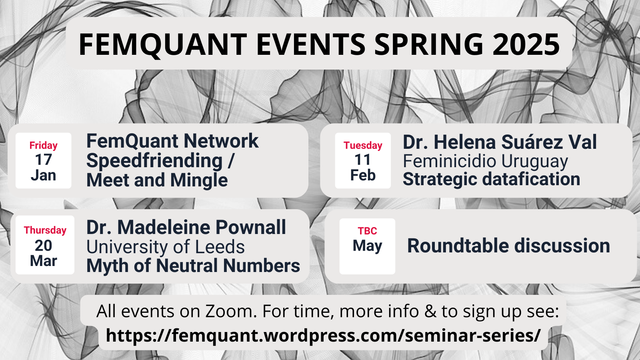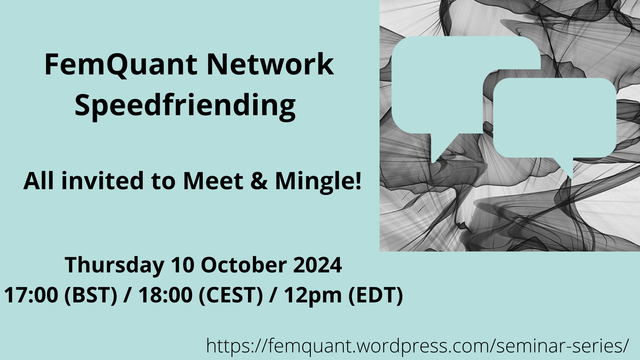We are really excited to announce the events coming up this Spring! See thread below for information about our events and speakers. For more details and to sign up (and for updates on our event in May): https://femquant.wordpress.com/seminar-series/
Lecturer in Sociology at Sussex. #FemQuant organiser & co-founder. Family demography, #feminisms, #CritQuant data, families&work. She/her.
There is still time to sign up! Join us tomorrow for our first event of Autumn 2024 for an informal network Meet & Mingle. More info & sign up: https://femquant.wordpress.com/seminar-series/
FemQuant monthly online events are back! We're kicking off with an informal network meet & mingle on 10 October, followed by fantastic research seminars coming up in November and December. For details and to sign up: https://femquant.wordpress.com/seminar-series/
Please join us for the May FemQuant event when Dr Kamden Strunk will present on QuantQueer: Imagining Queered Quantitative Methodologies. Wednesday 8 May 2024 on Zoom. More info & link to sign up: https://femquant.wordpress.com/seminar-series/ #FemQuantSeminar #CritQuant #QuantQueer #FeministResearch #QueerStudies
Join us for our first ever FemQuant Methods Club! We'll be chatting about MAIHDA for intersectional research. Thursday 11 April 3pm UK. More info, suggested reading & to sign up: https://femquant.wordpress.com/seminar-series/
This idea gets aired a lot: "any hypothesis, no matter how bigoted, can be safely postulated and tested because the ‘scientific method’ weeds out untruths".
But it's wrong. Please read 👇
The myth of value-free science
1 in 4 pregnancies end in a #miscarriage which has implications on fertility intentions, mental & physical health.
The SOC-MISC project studies social inequality in miscarriage and its outcomes, lead by P.I. @heinivaisanen funded by the #ERC.
The host institution is INED, partners are University of Helsinki, the Finnish Institute for Health and Welfare, and University of St Andrews.
See more: https://soc-misc.site.ined.fr/en/
#populationhealth #socialinequalities
@sociology @demography
📣 An important announcement! My #ERC project Social Inequalities in the Risk and Aftermath of #Miscarriage (SOC-MISC) now has an online presence. Follow us here on Mastodon and check the profile description to find the link to our website and more information about the project.
Please boost!
📣 Please join us for our next FemQuant research seminar when Zuzana Dančíková will present her research on fathers' leave in Slovakia as a case study in how *not* to study the effect of parental leave policies. 📅 Wed 13 March, 4pm GMT. More info & sign up: https://femquant.wordpress.com/seminar-series/
Reminder to sign up for our speedfriending event next Friday if you haven’t already!
16 February 2024 17:00 (GMT) / 18:00(CET) / 12pm(EST). On zoom & open to all.
Excited to see you all next week! We’ll be sharing the zoom link and the final breakout room prompt questions the day before the event https://sciences.social/@FemQuant/111811133648132985
We're pleased to announce the full FemQuant Events program for Spring 2024 ! All on Zoom, free and open to all. For more info & links to sign up: https://femquant.wordpress.com/seminar-series/ #FemQuantSeminar #feminism #quant #socialscience #FemQuant #CritQuant
This little article is very close to my heart. (And not just because I am an only child myself by most definitions.) It went through *many* reincarnations before finding its final form. I’m very grateful to my co-author Alice Goisis for not giving up on this little mini-paper, & to the anonymous reviewers whose comments helped us along the way! Full text free here:
https://rb.gy/w6p414 & Stata code to derive an only child indicator in four UK birth cohorts here: https://rb.gy/bfopfo
Given increasing family complexity this may become more problematic and affect results going forward. Changes to data collection practices would improve both the identification of only children and enhance our understanding of the variety of sibling experiences.
Finally we show that both size & composition of the group identified can vary across definitions. We reflect on how the mother-bias in surveys about families/children & lack of data about fathers who live in another household, AND any social or half siblings who live there with him, limits accurate operationalisation of certain definitions.
We discuss how the prevalence changes with age in childhood and compare estimates based on cross-sectional & longitudinal derivations. Relevant if using cross-sectional household grid information or retrospective questions about childhood family size.
To help, we propose a framework for researchers to think through the definition suited for their research question. Then we compare prevalence estimates for two definitions using British birth cohort studies data with estimates derived from national birth registration statistics.
Demographers are generally v good at accounting for how they operationalise their measures! But we call for greater conceptual clarity and critical reflection on the extent to which the operationalisation diverges from the theoretically-informed preferred definition and how this divergence might affect the results/ conclusions.
We argue there is no universal only child definition of that is suitable for all research questions. It really boils down to what researchers think the theoretical explanation for only children’s distinctiveness is - and therefore which siblings ‘count’ for the purposes of categorising individuals as ‘only children’ or people with siblings.
Who is an only child? And how do we find them in our data? These were questions Alice Goisis and I spent a long time mulling over when I first joined CLS in 2019 to work on her Only Child project. We’ve distilled our discussions into a short Research Note, out now online in Demography: https://rb.gy/xovdao
Happy New Year all! Please join us next week, Wed 17 Jan 4pm(GMT)/ 5pm(CET) / 11am(EST) for our first #FemQuantSeminar of 2024. Dr Ann Moore will present new data from Colombia on "Obtaining Medication Abortion Drugs Online Through Informal Channels". Sign up & please share: https://forms.gle/BddfVLAnA1mHFrY99

